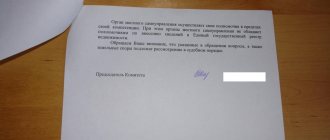Home /Articles on bankruptcy of individuals
Author of the article: Konstantin Milantiev
Last revised September 04, 2021
Reading time 9 minutes
Bailiffs have ample opportunities to ruin the life of a debtor as part of forced collection. Citizens are quite logically interested in whether and how long the statute of limitations for enforcement proceedings exists. This question is probably of interest to the creditor, since delay means the impossibility of subsequent collections. We'll tell you when the collection of old debts stops.
Let's understand the concepts
Strictly speaking, the term “limitation period” is incorrect to apply to a writ of execution and a court order. This is explained simply: the statute of limitations concerns the right of a person to file a claim in court. The legal period for filing a lawsuit is 3 years from the date when a person learned of a violation of his right. For example, when a person stopped paying a loan. The court issues a writ of execution or order when the claim is satisfied, that is, the trial has already been completed.
At the same time, “statute of limitations” is a term that is well understood by everyone. That’s why it is often used even where it is not entirely legal. The main thing is that the participants in the conversation understand what exactly is being discussed.
Statute of limitations for debt collection
Statutes of limitations for various reasons
First, it makes sense to understand how long a writ of execution for debt collection is valid. The answer depends on the type of writ of execution (hereinafter referred to as IL). In accordance with Article 21 No. 229-FZ:
- As a general rule, the creditor has three years to present a writ of execution.
The countdown begins from the moment the court decision enters into force; - IL with an omitted statute of limitations, but restored by a court decision, must be presented for collection within two months;
- IL with regular payments can be presented during the entire period of these payments, to which another three years are added;
- IL for administrative offenses is valid for two years
after the entry into force of the court decision; - The statute of limitations for an IL with a claim for the return of a child who entered the territory of the Russian Federation illegally is one year.
A court order is presented to open enforcement proceedings no later than three years from the date the document enters into force.
Two more special cases deserve special mention:
- a court decision where the debtor is given a period of time for execution,
- the debtor received an installment plan or deferment under the IL.
Then the period for collection under the writ of execution begins from the end of the time for payment or deferment of payments.
When the deadline is interrupted
Article 22 No. 229-FZ provides for two cases of interruption of the three-year validity period of the IL:
- Submitting the sheet for execution to the bailiff or the bank.
- Partial execution by the debtor of a court decision.
After the expiration of the grounds for interruption, the validity period of the writ of execution for the collection of funds continues.
If the IL is returned to the creditor due to impossibility of execution, the statute of limitations is counted anew. That is, if the bailiff returned the sheet or order due to the fact that he did not find the debtor and his property, then the bank will have another 3 years to present the documents again. But No. 229-FZ provides for two exceptions:
- the return occurred at the initiative of the creditor;
- The debtor has taken actions that interfere with the collection of the debt.
In these cases, the period of enforcement proceedings interrupted due to the claimant is deducted from the time for applying to the FSSP (3 years).
If the debtor is declared bankrupt, this means the automatic termination of both the IL and the previously opened enforcement proceedings. This is regulated by the provisions of Article 96 No. 229-FZ (clause 4).
In this case, the enforcement proceedings are suspended, and all related seizures of property and money, bans on traveling abroad and driving a car are lifted from the beginning of the bankruptcy procedure in court. And after the court completes the procedure and writes off the debts, everything is used. Bailiffs are required to close cases. Banks cannot resume collection, even if the person gets a job or receives other income (inheritance, gift).
Compensation for losses from illegal actions (inaction) of the bank
| TOPIC/SITUATION | POSITION OF THE COURT |
| Poor execution of executive documents by the bank | Failure to fulfill or improper fulfillment by the bank servicing the debtor's accounts of the obligation to execute enforcement documents, including verification of their authenticity, may become the basis for compensation to the debtor and/or the collector for losses caused by such actions (inaction) |
| Bank withholding from salary more than required | Collection of losses from the bank in the amount of amounts transferred to the creditor in excess of the maximum permissible monthly deductions from the salary of the debtor-citizen is permissible provided that the bank knew and/or should have known:
|
| There are no funds in the account for collection | If there are no or insufficient funds in the debtor’s account, the bank places the writ of execution in the file cabinet, and if there is a corresponding application from the claimant, it returns the writ of execution without execution. In this case, there are no grounds for collecting damages. |
| The bank declares that the account is closed and refuses to fulfill | The bank's refusal to execute the writ of execution due to the termination of the bank account agreement with the debtor may be grounds for recovery of losses from the bank if at the time of such refusal the debtor's bank account is not closed. |
| Consequences of collection through child benefits | The bank's foreclosure on funds for which this is prohibited in Part 1 of Art. 101 of the Law on Enforcement Proceedings, including for child benefits is illegal. The debtor has the right to recover from the bank losses caused by such actions. |
The procedure for restoring a missed deadline for applying to the FSSP
The grounds for restoring the deadline for filing an application with the FSSP are established by Article 23 No. 229-FZ. It contains a list of valid reasons, if documented, the court will extend the period when a claim can be filed. sheet. These include:
- illness of the creditor (confirmed by medical documents);
- lack of information about the possibility of collecting the debt (the situation rarely arises - if the writ of execution has not been sent to the collector);
- long-term business trip (required to provide a travel certificate);
- other circumstances that the judge considers objective.
In practice, these are isolated cases when the claimant is an individual. the person has been ill for several years or is away from home. If the creditor is an organization, bank or microfinance organization, then the terms are not restored.
Deadlines for opening enforcement proceedings
How bailiffs work - law and realityRelated article
Readers ask how long the bailiff's writ of execution is valid, hoping to write off debts within the time frame. If the sheet is presented to the FSSP, then its validity period is unlimited - the bailiff will collect the money until full payment is made, or will end the case if there is no income or property.
In this case, the bank or other creditor can present the IL again in six months or earlier if the debtor has finances or property is discovered.
Duration of enforcement proceedings
The next question is how long does enforcement proceedings last for bailiffs? According to Art. 36 Federal Law No. 229-FZ, the FSSP employee is given two months to execute the court decision.
In practice, cases where debt repayment occurs in such a short time are extremely rare. At the request of the claimant, the bailiff may extend the term, for which he will issue a separate ruling - for example, if no answers have been received from the state. authorities about the debtor's property, if the person is wanted, if an auction is being prepared.
Enforcement proceedings may also be suspended:
- by a court decision - for example, if the debtor challenges the collection on newly discovered grounds or when bankruptcy is declared in the Arbitration Court;
- in the event of the death of the debtor or his recognition as incompetent - until the date of identification of heirs or guardians;
- at the request of the debtor himself - in case of his illness or conscription into the army.
If the bailiff checked the property and income of an individual. person, and came to the conclusion that there is nothing to collect, the IL is returned to the collector. Resumption of enforcement proceedings occurs at any time in accordance with a repeated application by the creditor. As already noted, the basis for its complete termination is the bankruptcy of the debtor.
What do you need to get an i/sheet?
There is only one single condition - that the court decision acquires legal force. Sometimes you have to wait 2-3 months if the losing person does not accept his defeat. The law allows for the possibility of challenging, and many take this chance.
But sometimes things happen differently. As soon as one month has passed, the decision becomes legally binding and measures can be taken to collect money. True, you should first obtain one important document in order to then submit it to the BSC.
It is issued by the judicial body that resolved the dispute between the plaintiff and the defendant. No additional documents are required to be submitted. Everything that is necessary to produce a sheet is included in the materials. The plaintiff will be required to submit only one written statement.
Deadline for payment of court debt
The debtor is given 5 working days to voluntarily comply with the court decision. In this case, the enforcement fee is not charged - 7% of the debt amount, but not less than 1000 rubles.
The period is counted from the date when the debtor received a copy of the resolution on the commencement of enforcement proceedings in any way:
- in the hands
of the bailiff; - by mail
is the most common method. A copy of the document is sent to the debtor's address. Moreover, if the debtor does not receive the letter due to his own fault - he refuses to deliver it at the post office, then he will still be considered notified; - through State Services.
Yes, in 2021 the bailiff has the right to notify the debtor about the initiation of a case on the State Services portal, and such online information is considered appropriate and completely legal.
If within the next 5 business days the money is not sent to the FSSP account, the debtor will have to pay a fee for the service. Moreover, if the person subsequently pays on his own or agrees with the creditor on a repayment schedule, the fee will still be collected.
You can check the debt with the bailiffs by last name on the official website or through our verification service. Both are free.
Actual fulfillment of requirements
Here we are talking about the actual implementation of the necessary requirements. If there was a debt, then it was paid, and there is documentary evidence of this. In procedural terms, again, one should not confuse the end of proceedings due to the fact that the debtor has paid off the debt, and the issuance of a resolution to terminate or suspend enforcement proceedings, which is carried out by a bailiff or court. The latter is associated more with procedural phenomena than with the specific actions of the citizen to pay the debt.
How quickly do bailiffs close proceedings?
Termination of recovery in enforcement proceedingsRelated article
The inability of the debtor to fulfill financial obligations established by a court decision becomes the basis for termination or termination of proceedings. The bailiff makes such a decision within a period of two months to three years after opening. The writ of execution is returned to the claimant.
After the bailiff completed the case under Part 4, Clause 1 of Art. 46 Federal Law No. 229, a citizen has the right to submit documents to the MFC to write off debts of up to half a million in out-of-court bankruptcy.
At the same time, in the list of creditors you can indicate not only the debt that the bailiffs had, but also other arrears - outstanding loans and microloans, housing and communal services, taxes and fines, even debt for the Internet or telephone.
How to prepare documents for free bankruptcy through the MFC, how much they will write off, and what you can do during the procedure, we described in a special material.
Until the citizen has written off the debts through the MFC, the creditor has the right to resume proceedings - re-submit the application and sheet to the FSSP. It is important that the countdown of the deadline for submitting the writ of execution to the bailiffs after the return of the IL due to the impossibility of collection begins anew.
If there are no grounds for ending the proceedings - for example, a person has a salary or pension, he receives regular income, then the reason for closing the cases will be the recognition of bankruptcy of the individual. persons through the court. This is a real and legal way to get rid of debt, and the total amount should be at least 300 thousand rubles. There is no upper limit - at least a million, at least 100 million rubles.
Does the document also lose its validity if it is in the possession of the bailiff?
The case was opened a long time ago, but the main amount of debt remains unpaid. This is the most common complaint from creditors. Citizens worry whether they will eventually receive the money, even if everything was done correctly and on time initially.
Example
It’s been more than three years since I turned to the joint venture,” Victor tells the lawyer. The documents were submitted to the bailiff on time, immediately after the appeal rejected the defendant’s complaint. The bailiff took the case into his own proceedings, but little changed from this. Some part was collected, but it does not constitute even a quarter of the total debt. Will the writ of execution lose its force, since three years have already expired?
The basic requirement of the law was met. Everything was submitted to the bailiff service in a timely manner. Therefore, there is no reason to worry about the validity of the main document. If the proceedings are open, then the bailiff is obliged to take all measures given to him by law. In such a situation, collectors are usually advised to try filing a complaint. It is possible that the official did not take all possible collection measures.
FAQ
When can production not be reopened due to the expiration of the statute of limitations?
Discovery is impossible if the creditor has not contacted the bailiffs within three years after the court decision was made or after the return of the IL to the recoverer. In a number of special cases, which are described above, instead of three years there will be shorter terms.
Is the number of repeated applications to the FSSP limited?
Such restrictions are not established by current legislation. The only requirement that is presented to the claimant is to comply with the deadlines established by the enforcement procedure.
How much time is given to the claimant to re-apply to the FSSP?
Repeated presentation of the IL to the FSSP for forced collection of the debt after the return of the document is possible after six months. For other executive documents, except for the sheet - orders, contracts with the executive. a notary's inscription, traffic police regulations - a period of two months.
The claimant can resubmit the claim without waiting 6 months if there is information that the debtor’s financial situation has changed for the better.
The most accessible and correct way to understand this not so simple problem is to contact professional lawyers. If you need to write off debts due to the expiration of terms or due to the impossibility of payment, call us! We professionally deal with personal debts. individuals and help you get rid of loans according to the law.
DebtsLimitation periodBailiffs
Author of the article Konstantin Milantiev
Publications 222
More information →
about the author
Expert in the field of bankruptcy of individuals. He has been an active arbitration manager since 2015. Konstantin’s publications are published in various expert publications and media. Active participant in conferences, seminars and discussions on amendments to the current legislation of the Russian Federation on bankruptcy.
Rate this article
2 liked
Share with friends:
How long does it take for information about debts to be removed from the FSSP website?
A bank of existing enforcement proceedings has been created and put into operation on the FSSP web page. The site is designed to check information about the debt of individuals and legal entities.
The system indicates only those ILs that are subject to execution:
- the arrears were not repaid;
- the defendant lacks funds or property to pay the debt;
- there is no current information about the defaulter.
Information is stored on the portal until they are fully executed or when the documentation is returned to the creditor due to the impossibility of complying with a court order. The total period for which information is available on the site is three years.
Accordingly, information about the debtor can be removed by closing the arrears or contacting the bailiffs to resolve the situation. In addition, the debtor can agree with the collector on payment of the debt in installments - the plaintiff will withdraw the writ of execution. Information from the FSSP website is automatically removed after the relevant information is entered.






